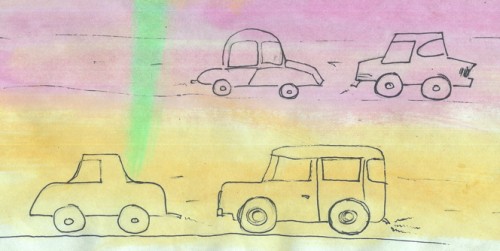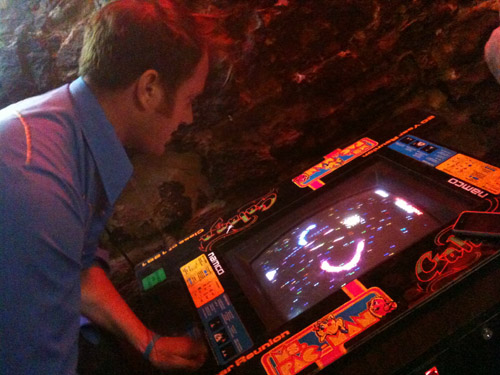This is a true story which shows how easy it is for addiction to manifest in our lives, no matter how silly or harmless it is.
Even though this is a little playful, it illustrates the process of forming and then overcoming an addiction.
You’ll see how a particular behaviour becomes habitual, which leads to an obsession and then addiction. Then, as an awareness of a problematic behaviour increases, an acceptance occurs of what needs to happen for things to change. That is when the application of strategies to overcome the addiction can be properly administered. In this example, with a mix of luck and commitment, you’ll watch the addiction be overcome.
Now please hold tight and enjoy the ride.
I work in the community services sector, both formally and privately, with an array of clients in a therapeutic and developmental capacity.
Many of them are children, both adolescents and teens, who just need a positive role model who challenges them to grow in a way that they can relate to.
But even a health worker sometimes needs to heal.
One of my former cases involved a 17-year-old young man with significant challenging behaviors. He had a history of breaking the law and was in and out of juvie. He was kind of off the rails, although he had a good heart which was unfortunately covered with layers of fear and trauma. He used humor as a way to escape his suffering. He also had several mental illness diagnoses which were a reflection of how difficult it was to connect with him.
Generally, I would hang out with him each week. I would drive him to appointments when he needed some medical or financial assistance, as well as to refuges when either he was at his breaking point at home, or when his family had had enough of him.
That’s how I was introduced to ‘Spotto.’
The game of Spotto goes like this: if you see a yellow car, you yell out “Spotto!” Whoever gets it first acquires one point. Each trip—from point A to point B—is one game. Whoever has the highest score when exiting the car at point B, is the winner.
It is a game played by kids at both primary and high school, and apparently by many adults as well. It’s been around for a long time, although I’ve only been playing it for the last few years. There are many variations of the rules, such as some kids will punch their opponent in the arm every time they legitimately call a Spotto.
In other variations, particular colors of cars also have different names and points which are attributed to them too.
When I first starting playing this game, my opponent was hell-bent on winning. We were generally neck and neck throughout the game, and as it would turn out, the overall result of all the matches we played was a tight finish. Yet it didn’t matter who actually won because it was a healthy competition which had him focused on something positive and fun, instead of behaving in a negative and dysfunctional manner.
For example, he was easily bored if he had nothing to keep him occupied, so he would randomly yell profanity and abuse out the window to unsuspecting pedestrians. He would scream like a banshee and scare the heaven out of his victims. I know I much preferred to play Spotto then to try to manage his attention seeking behaviors, especially because during the game I could engage him in a therapeutic manner.
If he was losing, he would get all worked up, but in a funny kind of way. He loved the challenge and he loved to engage deeply in it. He also loved to play it up—so even if he was losing, it was more of a ‘pretend’ emotionally heightened response. After all, he had more pressing mental dysfunction to deal with.
If we were both super close to scoring a point and I got in first, he would sometimes scream so loudly that I just couldn’t help but laugh outrageously in response. He would afterwards too. It wasn’t a spirit-suffocating scream, but an organic expression of passion. The game was literally therapy for him—the anger that he had been suppressing from the problems in his life would be instantly released.
We played Spotto basically every time we were in the car together. This occurred for well over a year, maybe closer to two. It would generally be once or twice a week, or sometimes three. I was getting quite good at it in the end, because I had to manage keeping a sharp eye out for a yellow flash whilst driving safely and effectively. My multitasking skills were impressively developed as a result.
Around halfway through this period, I got a new case with a young girl of around ten years of age. She was a beautiful child with a good nature and no serious emotional or developmental issues. Once a fortnight, I would drive her for a visitation with her family and we became quite close. I would always look forward to her telling me about her dreams which had turned out to be a premonition of her eventuating reality.
For example, she told me she had dreamt about the new family dog a week before the pup was brought home as a surprise.
One day she expressed to me that she had a dream the previous night which came true: it was about her friends and their specific actions which they had exactly enacted at school that very day.
On another occasion, I had gotten a little lost on our journey. We drove past a telecommunications tower and she said “that was in my dream last night.” In that moment I knew that we weren’t lost; we were exactly where we were meant to be. I kept driving according to my intuition and almost immediately we were surrounded by a familiar environment and back on the right path to our destination.

We also played Spotto, but this version was more complex. They were the rules of her and her friends. I’m sure there was a method to their madness, but purple cars were called ‘Smiggles’, pink cars were named ‘Fairy Floss’, orange cars were classified as ‘Sminky’ and green cars were aptly termed ‘Snotto’.
This game was hard. The different colors were worth different points. Sometimes we would drive past a car yard and we’d be yelling out a tonne of different cars at once. It was near impossible to keep an accurate score so after a few months we reverted back to just plain old ‘Spotto & Fairy Floss’.
It was a relief. It made the game a bit less intense so we wouldn’t leave the car overwhelmed in excitement. We were also able to determine a fair winner too. The little champion always held her own, although I do admit to sometimes secretly letting her win. After all, I had to keep her interested, but I’d make her work for the win though.
Throughout this period of my life, I was participating in a mixed exercise routine. At times I would train hard in the boxing gym for months on end and at others I would just chill out with some random exercise interwoven into a more party lifestyle. But it was when I got back into running a few times a week, I began to realize I was forming an addiction.
I would generally jog after arriving home from work. Living in the Lego-land of inner Sydney, I didn’t have many natural trail options so I would just cruise through the city streets. That was when I caught myself playing Spotto, by myself, over and over again. My interest was slowly becoming an obsession.
Regardless if I did or didn’t have my music and earphones on, playing this game would help me to melt away the time by entering into a meditative state. This internal dialogue became a normal and accepted part of my life.
Somewhere around the same time, I introduced the game to my partner. We really enjoyed playing together because we were always on road trips to visit our family and friends.
We evolved the game to a whole new level. First we started with Spotto only. Any car, van or bike that was at least 51 percent yellow was accepted, but no buses or big trucks were. However, if it was smaller than a heavy truck, it was generally recognized as a fair point.
Then we authorized the entry of Fairy Floss’s into the game. They were worth two points, instead of one, so it gave us an extra kick of adrenalin to spot one; the Spotto ‘fix’ was becoming more extreme. The exact shade of color was sometimes hard to define, so even purplish-pinkish cars were given the thumbs up. This is when the technicalities of the game really began to be bubble up to the surface and take on a life of their own.
One day we were going for a run together and we went past a black motorbike with pink trimmings. I called “Fairy Floss” and it was momentarily allowed. We later had a discussion about it. My partner said: “I’m not sure I should have permitted that Fairy Floss because there was no way that it had more pink on it then black”. I replied: “Well now that we think about it, black technically isn’t a color, so it is disqualified when calculating the percentage of color on the bike”. From that moment on, we took Spotto through a humorous progression of super-refined logic.
Both white and black weren’t incorporated into the equation if there were competing colors. A black car with yellow racing stripes got the tick. So did a white van with a yellow business advertisement on the side of it. Even a white or black car with pink number plates made the grade, although yellow obviously was prohibited due to the state number plates being a stock standard yellow.
No one would have the energy or audacity to play that game.
We loved it. On some of our long trips, we would both rack up a score of more than fifty points each. My partner would send me into a laughing fit because she would scream exactly like my first opponent used to. She wanted to beat me so bad; it was almost like she wanted to see me bleed yellow and pink. On the rare occasion she would win, but generally if I was properly focused I had her covered.
But then she got better at it. She was so hungry to win, that she would. She would check out the distant cars down the side streets that I couldn’t monitor without risking our safety on the road. Massive car parks she would have a field day in. Every vehicle on the road was carefully inspected for potential points.
It was that word—vehicle—which brought about another revolution in our game. What is a vehicle? Is it something which facilitates the movement of a person from one place to another? Yes? Well, if that is the case, then a pram, surfboard, caravan, bicycle or even a kid’s tricycle in their front yard is arguably a part of the game that we are playing.
That was when the game hit warp speed: the addiction had been formed.
Anything with the potential of enabling human mobility, or even animal mobility, was sanctioned. Is that a bird, a Spotto plane or super…wait, that is a Spotto plane! If we were watching a cartoon on the TV and a bee was carrying a fairy—boom—a successful Spotto call! Even the image of a vehicle was accepted, such as a yellow jet ski on an advertisement sign.
The game began to consume both of us; we both literally started to dream of playing it.
Driving past a trailer with a tonne of yellow kayaks on it was a salivating sprayfest of Spottos. I don’t even know how many times that happened, but it was ridiculously common. Boats in the harbor were all potentially white with a yellow stripe. The huge range of shop fronts could have had yellow or pink snowboards, wakeboards, skateboards, remote control cars, slippery slides, model airplanes etc. We turned window shopping into a truly entertaining affair.
Then suddenly and without warning, yellow and pink shoes were certified facilitators of transport. We would not just be looking suspect and weird by scouring the streets; we would almost come off as perverted by looking at what everyone was wearing on their feet. I swear some people thought I had a foot fetish.
This was clearly getting out of hand. My addiction was now having an impact on how people viewed me.
What I did next was to admit I had a problem. Well, I had already done that jokingly, but this time I was fully accepting it. I had positively impacted and moved on from those previous kids and fortunately none of my new cases involved playing Spotto. Therefore, I was in the right space to give it up. I needed to give it up.
We decided that we weren’t going to play Spotto together anymore. When I went for a run, I had to force myself NOT to play. It was hard though, because I literally would call Spotto in my head if I wasn’t properly focused on not doing it. This is when it became blatantly obvious that the addiction was a real phenomena in my life.
For a couple of months it was tough – it was my default response to call Spotto if I saw a yellow car. But I stuck at it and it slowly began to lose its power.
Fortunately, six months earlier my partner and I had booked a trip to Peru to wash ourselves in tribalistic and shamanistic energy. With precision timing, it was our time to embark. The journey entailed three weeks of adventure, and even though admittedly we played Spotto a little bit over there, our minds were already well occupied by the experience of a foreign and heart-expanding place. I didn’t even have to be conscious of it, yet my addiction continued to be overpowered.
It showed conclusively how instrumental removing yourself from the environment where you had addictive behaviors is when trying to overcome your problem. That is why rehabilitation housing for any substance disorder can be so effective.
A fortnight or so after we arrived home, I had a snowboarding weekend booked. I went down to the snow and on the last day I snapped two ligaments in my shoulder. It was a serious injury and it meant that I was unable to drive and go to work. I hung with two of my brothers and because my writing arm was good to go, I wrote. I wrote so bloody much, contributing to where I am today with my writing pursuits.
I was stuck in the house so there were no Spottos and Fairy Flosses inundating my daily experience. I wasn’t with my partner for over two weeks so we weren’t able to be engaged in the game. It wasn’t till I arrived home, where the following weekend we went for a road trip, which I realized that I had fully overcome my Spotto addiction.
We both drove together engaged in either a fruitful conversation or a peaceful silence. There wasn’t even one Spotto acknowledged. It was natural too, not forced.
Therefore, it was a variety of orchestrated and synchronized circumstances that helped me to no longer be a Spottoholic. I became aware of the addiction manifesting in my life, accepted what I needed to do to change it, and then applied those strategies accordingly.
My addiction to Spotto manifested from a desire to connect with and help disadvantaged kids so it was a worthy sacrifice to make. I don’t regret one thing, however, be careful, don’t be fooled by those cute little kids who want to hook you on their ‘victimless’ games. They sure got me.
Now I just need to manage my addiction to writing.
Love elephant and want to go steady?
Sign up for our (curated) daily and weekly newsletters!
Author: Phil Watt
Editor: Renee Picard
Photos: elephant archives












Read 1 comment and reply